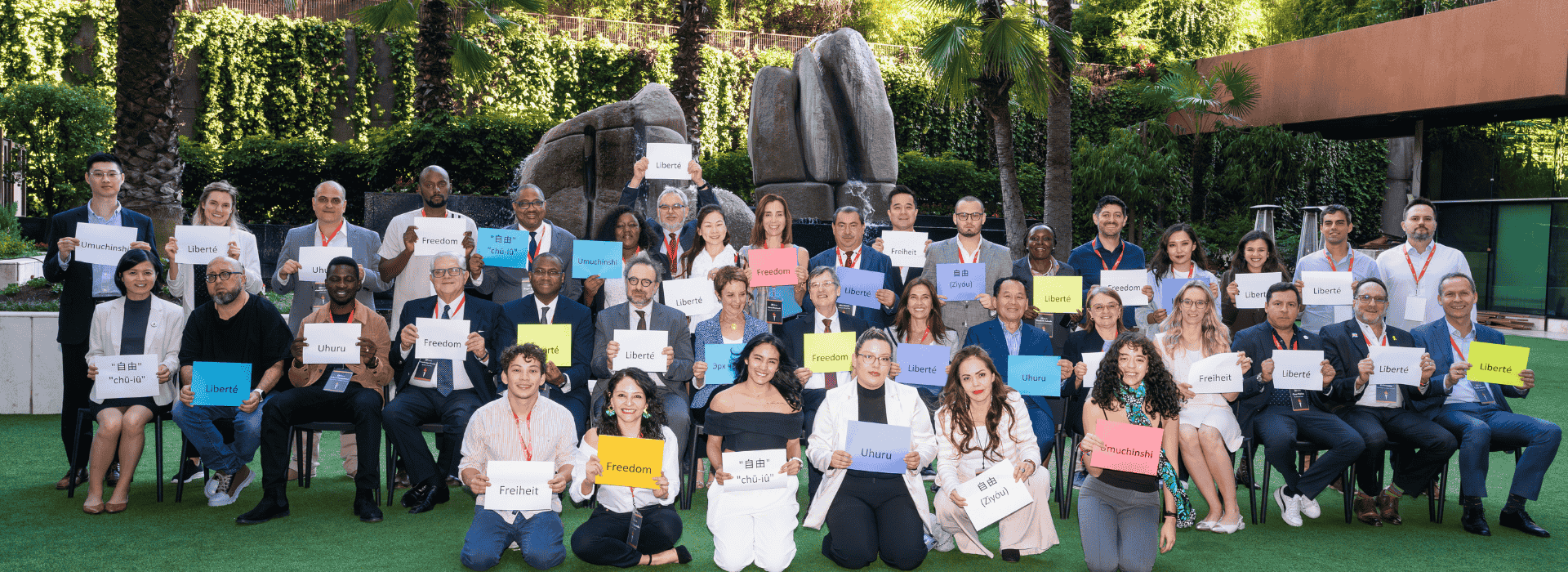
Participants from the event “In defense of Liberal Principles” held in November 2024
Defending liberal principles on a global scale
What do liberal politicians from Uganda, Venezuela, Israel, and Taiwan have in common? At first glance very little: they don’t look alike physically; they don’t speak the same language, share the same political situation, and don’t even use the same writing system. Yet, with all these differences, they are much more similar than one might imagine.
At RELIAL, on November 26-28, we organized an International Workshop for liberal political parties from 26 countries worldwide. The subject? The defense of liberal principles: something that might seem too vague, yet it is pivotal to the changes needed in a world where populism and authoritarianism are increasingly becoming the norm rather than the exception.
Resisting authoritarianism
Soon after we began, we realized that, with different faces, we all have a common enemy: the progress or settlement of policies that concentrate power in small groups, while all opposing voices are silenced.
Several of the participants were in exile or danger of arrest because of their political activism. From Latin America alone, those who should have been the hosts were unable to attend: Venezuelan Pedro Urruchurtu, the Network’s coordinator of political parties, is taking refuge in an embassy because of his actions to confront the regime of Nicolas Maduro, and Felix Maradiaga, president of RELIAL, was not able to travel because, after challenging the dictatorship in Nicaragua, he was imprisoned and subsequently expelled from his country and declared stateless. Unfortunately, they are not and will not be the only ones in similar situations.
Nevertheless, the stories of repression are also stories of resistance that inspire us to continue to raise our voices. One such example is Robert Kyagulanyi Ssentamu – known by his stage name, Bobi Wine – who today leads the opposition against the dictatorship in Uganda. Bobi began as a singer who, through his music with urban rhythms, criticized inequality and repression in Uganda; this experience prompted him to launch his political career and today he has managed to inspire thousands of people, especially young ones. Although the country is still ruled by a brutal dictatorship, the movement led by Bobi Wine has succeeded in getting more people interested in politics and combating apathy, one of the biggest challenges of any authoritarian regime. His story teaches the importance of persistence and reaching out to citizen concerns to get people to feel represented and therefore join the fight to regain freedom.
This and other stories shared during the workshop are a reminder of something we often overlook: no political success is individual. A single person, no matter how brilliant or virtuous, cannot single-handedly overthrow a regime. The politician must inspire others – allies or citizens – to build a path to freedom. This is where borders aside, we can learn from each other.
Learning from different contexts
The workshop was also a space for learning: on the one hand, through the experiences of other politicians and, on the other hand, through training with experts that allowed the exchange of good practices concerning communication skills.
We listened to the experience of different liberal parties in government: the DPP in Taiwan, the RHDP in Ivory Coast, and the FDP in Germany. They spoke about the challenges of coalitions, the importance of resilience, the challenges of public opinion, and the value of continuing to listen to the people during a government to keep adapting a government’s public policies.
In addition, we offered training on digital reputation and media appearances with two consultants who have worked extensively around the world: Albertina Navas, from Ecuador, and Teodor Tiţă, from Romania, both of whom provided mechanisms to improve one of the most important aspects of political figures: public image. While Albertina talked about how to strengthen a political profile on social networks with customized tools for each network, Teodor offered practical advice on how to face complex interviews on television.
What does defending liberal principles entail?
After nearly three days of activities and interaction, the question remains: what does it mean to defend liberal principles? Where can we meet if our situations are so diverse? Although the answer is not simple, it starts from two fundamental principles: firm convictions in the value of freedom, on the one hand, and resilience, on the other.
The first issue is self-explanatory, although it is easier said than done. With politicians from Asia, Africa, Latin America, and the Middle East, it became clear that none of us has the privilege of living in a society where liberal ideas prevail. Against this backdrop, it is much easier to build a political career on populism than to fight for liberal democracy.
Although I would like to say that persistence bears fruit and that eventually firm convictions will bring liberals to power, a glance at history is enough to realize that it is not always -and will not always be this way. It was clear from the exchange that principles are not something we stand for because it is practical, but because we think it is right and because the only way to ensure that there will be liberal rulers is to ensure that liberal politicians do not give up.
This brings me to my second point: resilience. Those who stand up for liberty often lose it. Challenging authoritarianism is a difficult and frequently dangerous path that can only be undertaken if we accept, from the outset, that success will not be a straight line and that we will encounter multiple challenges along the way, but that the battle, in itself, is worth it. As a result, the workshop participants leave us with inspiration to move forward and also the certainty that we are not alone in this struggle.

